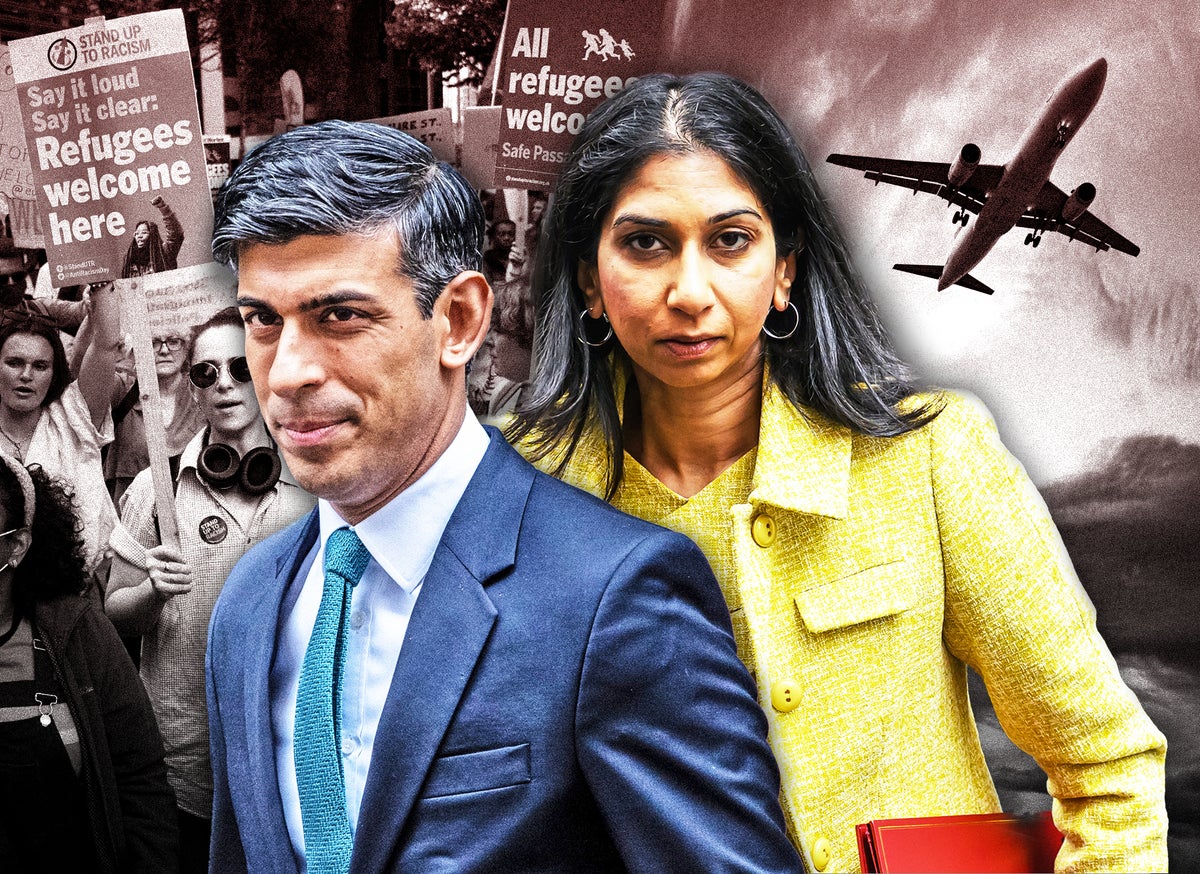
Rishi Sunak’s government has passed its controversial plans to tackle the small boats crisis after defeating a final series of Commons challenges by Tory moderates, with the Illegal Migration Bill now poised to become law.
In a long night of drama, the Tory frontbench saw off five further changes being sought by the Lords to the small boats bill, including modern slavery protections and child detention limits.
At least one other vote was ditched in the face of the government victories. The Archbishop of Canterbury, Justin Welby, who has been a strident critic of the bill, also dropped his demand for a statement on tackling the refugee problem and human trafficking to the UK, after a similar proposal was rejected by MPs.
It marked an abrupt ending to the parliamentary tussle over the flagship reforms that had threatened to go to the wire ahead of the summer recess. The bill will now go to the King to receive royal assent.
Earlier, more than a dozen Conservative MPs, including former party leader Sir Iain Duncan Smith, staged a final rebellion against the government over plans to deny migrants modern slavery protections.
Tory moderates had been hoping to win concessions on the issues of modern slavery and child detention, as well as creating new legal refugee routes to soften the impact of the small boats bill – condemned by campaigners as a “draconian” violation of international law.
But despite some senior Tories opting to rebel, MPs voted on Monday evening to reject each of the amendments proposed by the House of Lords.
The amendment aimed at retaining protections for modern slavery victims exploited in the UK, including those who are cooperating with criminal investigations, was rejected by a majority of 55. Despite expectations to the contrary, former PM Theresa May was not among the 13 Tory rebels.
An attempt by peers to impose an absolute time limit of 72 hours on the detention of unaccompanied migrant children was also rejected by a majority of 69 – a vote in which 11 Tories rebelled, including former ministers Tracey Crouch, Tim Loughton and Sir Robert Buckland.
Peers had also wanted to impose a duty on the government to provide safe and legal routes for asylum seekers to come to the UK – although this was rejected by a majority of 58 MPs.
After accepting some minor changes from the Lords earlier this month, immigration minister Robert Jenrick vowed that there would be no further climbdowns. He said critics of the bill had not put forward any “credible alternative”.
Prior to the vote, one senior Tory rebel told The Independent: “We would hope the government are going to have to give us something.”
Ms May had warned that if the Lords amendment on modern slavery was rejected it would “consign more people to slavery – no doubt about it”.
The former PM had argued that people brought to the UK in slavery should be exempt, under the Modern Slavery Act, from the planned detention regardless of their immigration status. She said it would it be “harder to catch” people traffickers by preventing victims from giving evidence.
The Lords inflicted a string of fresh defeats on the government last week over the much-criticised bill, which Mr Sunak and his home secretary Suella Braverman insist is integral to efforts to tackle small boats crossings in the Channel.
The bill is part of a package of measures designed to deter migrants by making it clear that if people enter the UK by irregular means, they will not be able to remain and will face being sent either to their home country or a third country such as Rwanda.
The government did make some changes to the legislation – agreeing that unaccompanied children cannot be detained any longer than eight days rather than the proposed 28. Ms Braverman also agreed to keep the current limit of 72 hours on the detention of pregnant women.
Braverman and Sunak are under pressure to deliver on their ‘stop the boats’ vow— (Simon Walker/No 10 Downing Street)
Despite Mr Sunak’s success in finally passing the bill in the Commons, the deal to send migrants on a one-way trip to Rwanda has been mired in legal difficulties and will end up in the Supreme Court.
With a backlog of asylum cases in the UK, the government is also seeking to cut the cost of hotel bills by using alternative accommodation including the Bibby Stockholm barge and former military bases.
Bibby Stockholm barge left Falmouth docks for Portland on Monday— (PA Wire)
The barge left Falmouth Docks on Monday and is due to arrive within 48 hours at Portland Port in Dorset, where it will house around 500 asylum seekers arriving from across the Channel on small boats. Dorset Council has been given a £2m funding package to meet the cost of providing services.
But No 10 insisted the plan would prove value for money, with Mr Sunak’s official spokesman saying on Monday that the barges and bases would “save the taxpayer money compared to spending on hotels”.
Shadow home secretary Yvette Cooper suggested that giant barges and disused military bases could continue to be used by a Labour government.
She refused to rule out use of controversial offshore accommodation – criticised by refugee groups and campaigners as akin to “prison ships” – but insisted Labour’s priority would be to clear the asylum backlog so that such accommodation was not needed.
It came as comedian Dom Joly, dressed as Mickey Mouse and holding a placard saying “stop child detention”, led a Save the Children protest against the bill outside the Home Office in central London.
The protest followed ministers facing criticism over a decision to paint over murals of Disney characters, including Mickey Mouse and Baloo from The Jungle Book, at a migrant reception centre in Kent.







